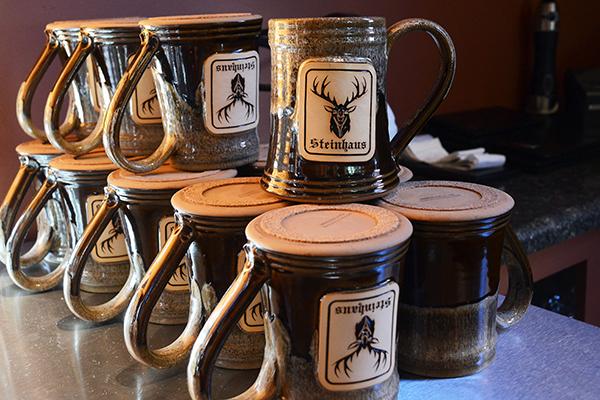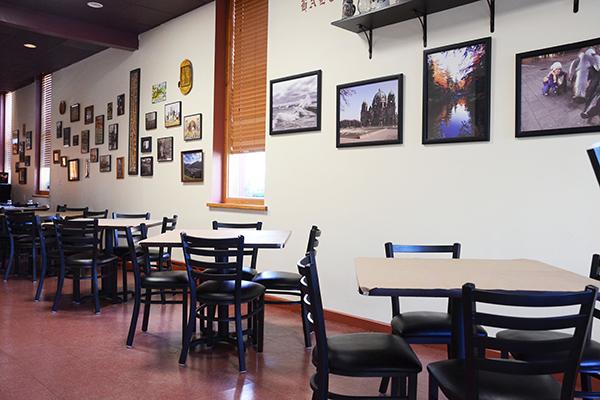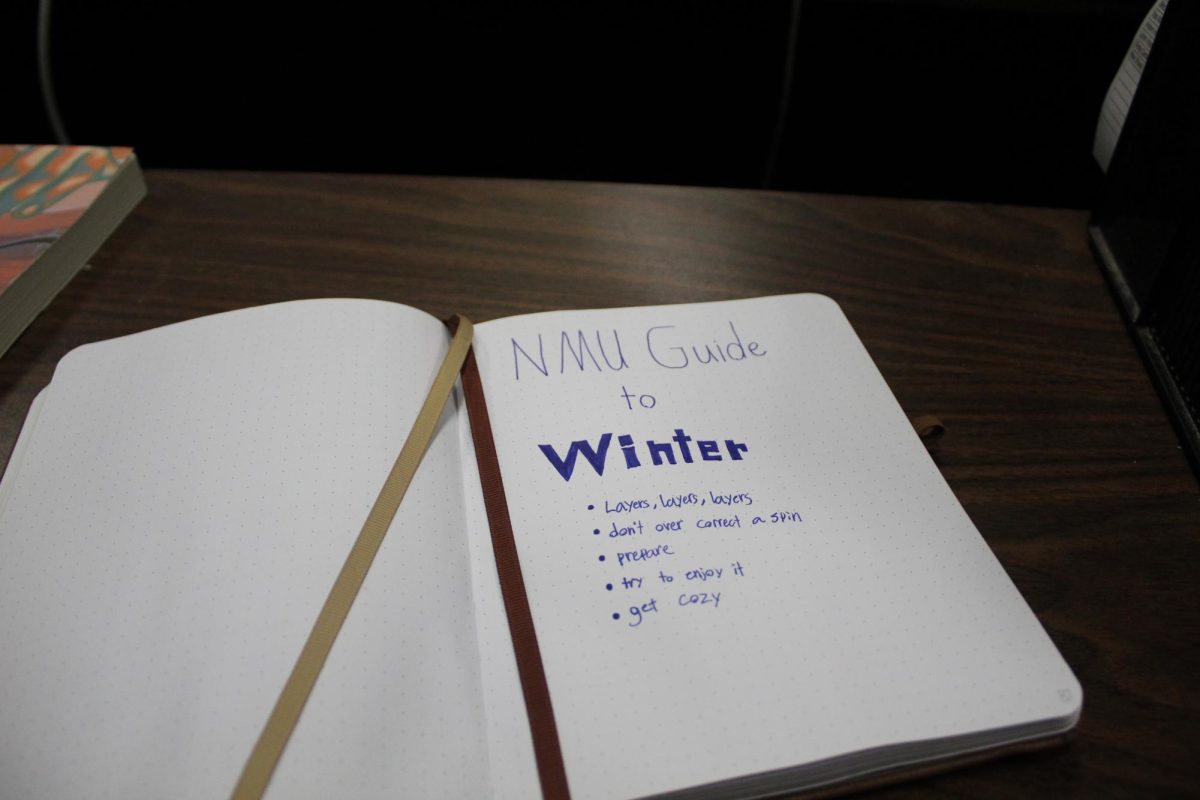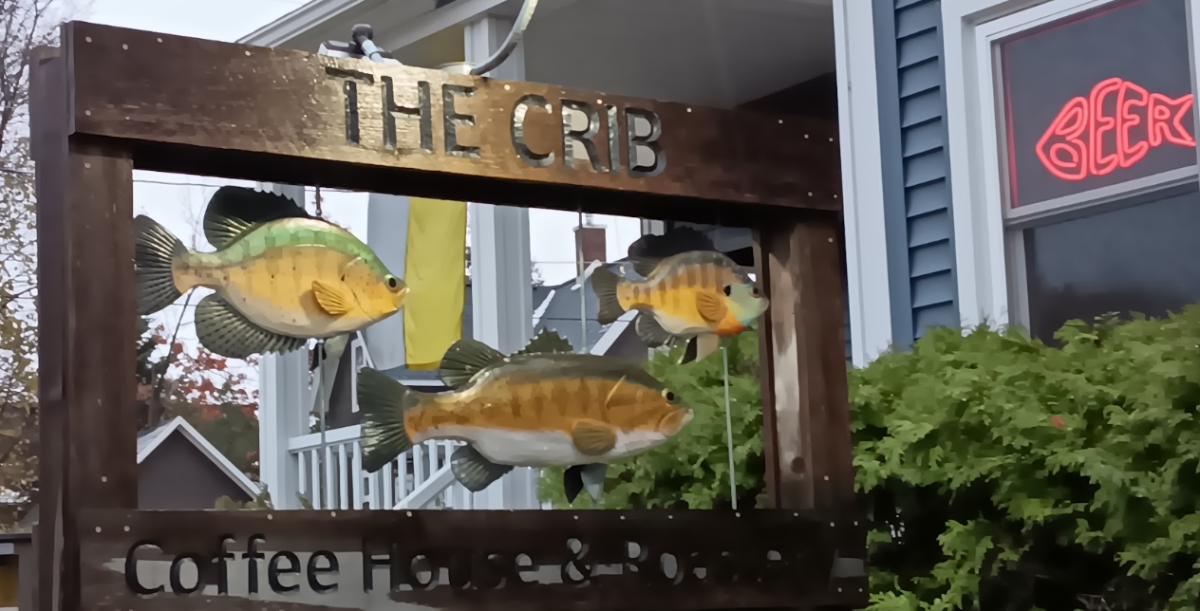A new German and European inspired restaurant in downtown Marquette is establishing itself as a gathering place for not just NMU students and community members, but also as a high-paced environment for two NMU culinary students to find real-world experience.
Senior hospitality management major Scott Seifert, one of three chefs working at Das Steinhaus said the work environment of the restaurant is refreshing in that it relies on the imagination and independence of its employees.
“It started out with just Colin (Campbell) and I working the line, and we obviously needed more people,” Seifert said. “Now on Fridays and Saturdays, [owner Justin Fairbanks] lets me and Colin work the line by ourselves while he washes dishes, which he loves. He manages from the dish pit which I’ve never seen an owner of a restaurant do. He’s pretty hands on.”
Seifert and fellow senior and hospitality management major Colin Campbell are two of the three chefs at Das Steinhaus that are also students in the NMU Culinary School, while, according to owner Justin Fairbanks, bar manager and co-owner Dave Cappeart also graduated from the NMU culinary program. And while Fairbanks attributes this connection more to coincidence than to an “overt collaboration,” neither he nor marketing director and friend Alex Kofsky could deny the benefit of the resources of having a “university in your backyard,” as Kofsky put it.
“We worked a little bit with (NMU culinary professor) Chris Kibit early on — just bouncing ideas off him when we were conceptualizing,” Fairbanks said of his relationship with Kibit. “We went and talked to him about our menu and he came in for our friends and family night and gave us some critiques.”
However beyond his dedication to local food and talented employees, Fairbanks emphasized that his biggest commitment is in making Das Steinhaus a welcome environment, whether his customers are college students ordering a beer and a wurst, or older families ordering more expensive dishes.
“[The environment] is fun, low-key and relaxed, but we’re serious about good food and drink,” Fairbanks said. “If you want to just come in and get a sausage, I want you to have the same experience as someone coming in to get a $30 duck entree, it’s all the same in my mind.
“We’re not trying to create an air of sophistication when we use words like ‘confit’ or we have a $30 entree, that’s just the cost of what it takes for us to make that product, and we want to present a product like that.”
Additionally, he said there are options for students and community members who may be on a budget.
“If you are on a budget, coming in and getting sausages is going to be your jam,” he said. “My main thing is that I don’t want Northern students to think this is out of their price range and they can’t eat here and they’re not accepted here — we definitely have an appealing vibe for them. That’s who we are, and that’s what I want to try to cultivate.”
Fairbanks said he had no shortage of inspiration in bringing Germanic cuisine to the Marquette community, and listed frequent trips to Germany and Austria, influence from friends, advice from past employers and a little bit of German lineage as the main catalysts in the restaurant’s creation.
“The idea two years ago was, ‘what if there was just a place that made sausages, let’s just start there,’” he said. “So that was the genesis of the whole idea. We rolled with it from there.”
Fairbanks’ initial plan of offering only sausage has since been expanded and refined to include a myriad of other Germanic and European offerings, including dishes like duck confit and wild venison, which can both be found on the preliminary menu for Das Steinhaus, which opened for the public on Wednesday, Aug. 7.
“I wanted to include things that I like to make,” said Fairbanks, who attended the Institute of Culinary Education in New York City. “My training was in French cuisine and that’s why we have the duck dish, which is more French than German, but I enjoy making that dish.”
The wild venison dish, which at $32 is the most expensive on the menu, was another offering that Fairbanks felt was necessary, having enjoyed venison frequently while growing up in Gladstone, Mich.
“I wanted to have wild venison because we’re Yoopers, and you can’t get venison anywhere (up here),” Fairbanks said. “And we take the least amount of money on the venison dish — it’s an expensive entree but it’s basically a labor of love, it’s on there because I want it on there. I needed to get that on the menu.”
Fairbanks said he buys venison from Texas, which has the only USDA-certified wild venison processing facility in the country. Otherwise, he said he is wholly committed to purchasing and supporting local products and businesses.
“We only work with one big distributor and everything else is local,” he said. “I’m pretty passionate about that, it’s just better product. What we get from local farmers, those vegetables look better than anything we could get out of a truck.”
As previously mentioned, Fairbanks has also taken strides to find employees that are as equally dedicated to cooking and serving local produce as he is, and has dedicated himself to empowering them to work independently in the kitchen.
“[Fairbanks] truly does empower the crew to make decisions and do things their own way,” said Kofsky, who also grew up in Gladstone and has known Fairbanks since they were nine years old.
As testimony to the environment Fairbanks has strived to create at Das Steinhaus, an occasional unsolicited ‘Prost!’, a traditional German toast, will echo through the restaurant on most nights, regardless of birthdays or anniversaries or an otherwise obvious reason to celebrate. Calling everyone to attention, the waitress or waiter will raise a stein to the indisputable Das Steinhaus philosophy: to eating well, to drinking well, to living well.
“We’ll find an excuse to do a prost every night,” Fairbanks said.
Das Steinhaus is open Wednesdays and Thursdays from 4 p.m. to 11 p.m. and Fridays and Saturdays from 4 p.m. to midnight. Their drink menu features over 30 beers, including an extensive list of Michigan brews and a selection from across the Germanic region, including from Hungary and Austria.































Amanda • Sep 6, 2013 at 12:40 pm
Nan, we apologize for the omission. The restaurant is located on Front street, where the Sai Uwa thai restaurant was previously located.
Bob • Sep 6, 2013 at 11:05 am
They also forgot to mention the adress when they first appeared in a MJ article months ago. I guess it must be some type of attention getter, like used cars ads that don’t mention prices. Groooan
Nan • Sep 5, 2013 at 6:20 pm
Did I miss it, or did the author of this article manage to not give a street address for this restaurant? “Downtown Marquette” covers more than one block — it would be nice to know just where this place is located.